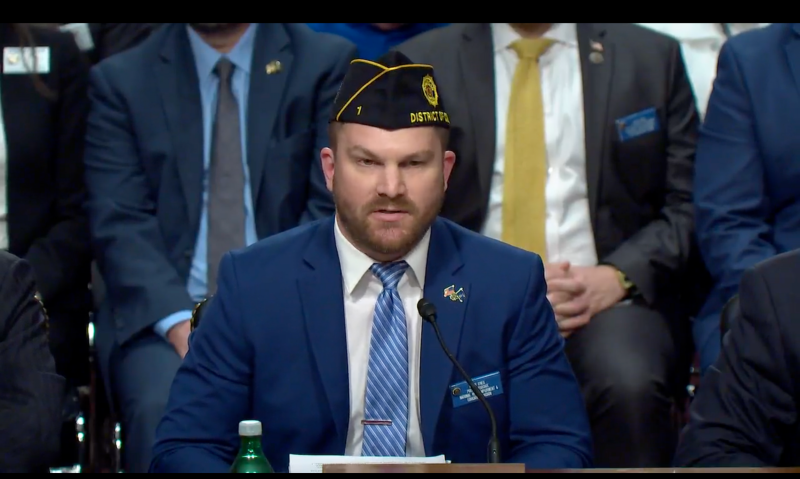
Make TAP accessible throughout service, Legion testifies
Kevin O’Neil shared his story of transitioning out of the Air Force during his testimony to a joint meeting of the Senate Committees on Veterans’ Affairs and Armed Services on Oct. 18. Watch the entire hearing here (O’Neil’s testimony begins at the 2:50:58 mark).
“My own transition journey began as I was driving down an unpaved road in Djibouti, Africa, with two of my fellow airmen,” O’Neil, Veterans Employment and Education policy associate for The American Legion, testified during the hearing, Military to Civilian Transition: Ensuring Success After Service. “I proposed the question: What do you plan to do when you separate? Neither knew. The uncertainty in their responses propelled me to start thinking about the path that I would take following my military career.”
With just over a year left in his enlistment, O’Neil hatched a plan to return to school. He obtained bachelor’s and master’s degrees after separation.
“While I am incredibly proud of these accomplishments, I recognize that I was fortunate enough to have found my path well before my separation,” he testified. “This cannot be said for all servicemembers, and I believe that this is why we are here today.”
The hearing focused on military programs such as the Transition Assistance Program (TAP) that assists servicemembers as they return to the civilian world.
“TAP offers a plethora of information that servicemembers can utilize to achieve success post-military service, but there are improvements that can be made,” O’Neil testified. “One improvement is seeing that servicemembers begin TAP no later than 365 days prior to their anticipated separation.”
He cited a Government Accountability Office report released in December 2022, that found 70% of servicemembers are not completing TAP within the mandated timeframe.
“With over 200,000 servicemembers separating annually, that equates to around 140,000 transitioning servicemembers who may have less than a year to plan for their future,” O’Neil said. “This is far too many servicemembers who may find themselves unprepared for the transition to civilian life. In light of the information gathered in this study, The American Legion would like to offer a couple of suggestions to remedy this issue.”
Those include:
• Look to the Veterans Affairs’ Military Lifecycle modules as a best practice for providing vital information regarding the transition process. The modules comprise 14 comprehensive sessions that allow transitioning servicemembers and their families to access TAP information throughout their service. “If the (Department of Labor) were to create online modules, similar to those offered through the VA, servicemembers and their spouses would have greater access to information that will prepare them for a successful career post-military service.”
• Create an app accessible at any time throughout ones’ military career. Such an app would provide information about TAP, as well as the programs offered by DOL, the Department of Defense and other agencies. “Through interagency partnerships, and the creation of a comprehensive military lifecycle app, we could ensure that servicemembers and their families have unfettered access to information that will assist in transitioning to civilian life.”
